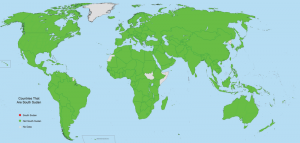June 21, 2015
Briefly
- A nice example of analysis using open data: trends and risk factors in mortgage default in the US, by Todd Schneider (via mathbabe.org)
- From Vox, for map nerds: “Countries that are South Sudan” in red, “Countries that are not South Sudan” in green, “No data” in grey

- Medical marijuana laws didn’t lead to an increase in teenage marijuana use in the US (MinnPost, Lancet Psychiatry). This is less unsurprising than it sounds, because in some of the states, (eg, California) the medical-use requirement is not all that stringent.
- A Tumblr about the “first book on data visualisation best practice”, published 100 years ago by Willard Brinton (via @alberto_cairo)
- Survey research finds that people who (claim to) have more sex are (or claim to be) happier. As XKCD has pointed out, this is something you can’t easily do a double-blind randomised trial of. But you could do a trial of encouraging people to have more sex. It didn’t make them happier. This is an issue more generally with lifestyle changes: just because a lifestyle difference would be good, it doesn’t necessarily mean that a doctor telling you to make the change will be good. (via Tim Harford)
- Google Research was looking for ways of visualising what actually happens in different layers of a computational neural network. They used feedback of images and amplification of layers to get things like

- Nice story in the Herald about second languages in Auckland. (though also note the Herald search page finds 514 stories with the phrase “melting pot”)
Thomas Lumley (@tslumley) is Professor of Biostatistics at the University of Auckland. His research interests include semiparametric models, survey sampling, statistical computing, foundations of statistics, and whatever methodological problems his medical collaborators come up with. He also blogs at Biased and Inefficient See all posts by Thomas Lumley »